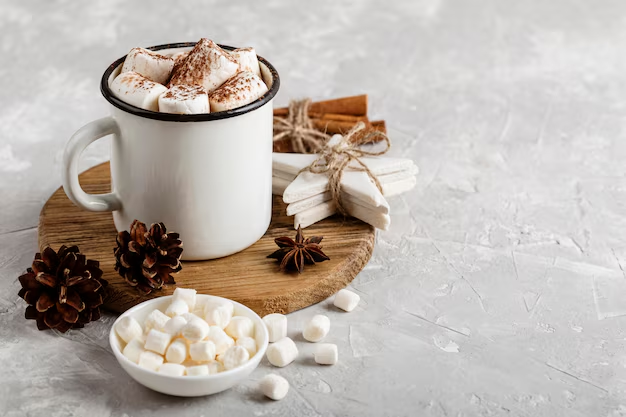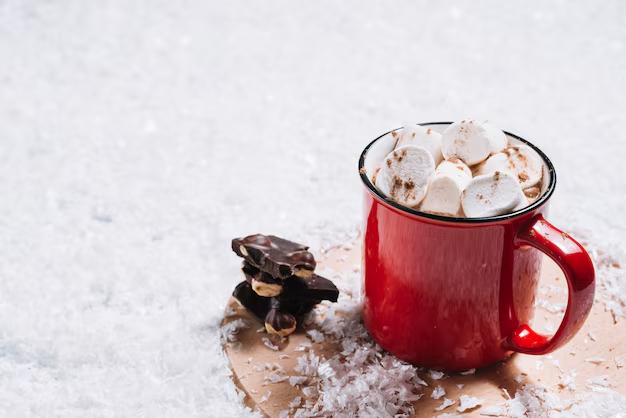Hot cocoa is a beloved drink enjoyed by people of all ages. Its comforting warmth and sweet flavor make it a go-to beverage on chilly days or cozy evenings. But for many, a curious question arises—does hot cocoa have caffeine?
This question is common, especially for those who are caffeine-sensitive or watch their intake. Hot cocoa, made from cacao beans, naturally contains caffeine. However, the amount is significantly lower compared to coffee or tea.
In this article, we’ll explore how much caffeine is in hot cocoa, compare it to other beverages, and discuss the factors that affect its caffeine levels. Let’s uncover the facts about this delicious drink.
What Is Caffeine and Its Sources?
Caffeine is a natural stimulant that affects the brain and central nervous system. It helps you stay alert and combats tiredness. This compound is found in various plants, including cacao, coffee, and tea.
- Natural Sources of Caffeine:
- Cacao Beans: The primary source of caffeine in chocolate and hot cocoa.
- Coffee Beans: Used to brew coffee, one of the most popular caffeine sources.
- Tea Leaves: Contains moderate amounts of caffeine, varying by type (green, black, white).
Cacao beans, the main ingredient in hot cocoa, naturally contain caffeine. When these beans are processed into cocoa powder, some caffeine remains. This is why this drink has small but detectable amounts of caffeine.
Does Hot Cocoa Contain Caffeine?
Yes, it does contain caffeine, but in much smaller amounts compared to coffee or tea. The caffeine in it comes directly from cacao beans used to make cocoa powder.
The exact caffeine content of hot cocoa depends on the recipe and preparation method. On average, a cup of hot cocoa contains 5 to 25 mg of caffeine:
- Homemade Hot Cocoa: 5–10 mg of caffeine.
- Store-Bought Mixes: 10–15 mg per serving.
- Dark Chocolate Variants: Can reach 20–25 mg per cup.
For comparison, a standard cup of coffee contains about 95 mg of caffeine. This makes hot cocoa a low-caffeine alternative for those looking to enjoy a warm beverage without the buzz.
Comparison With Other Beverages
When comparing hot cocoa to other popular drinks, its caffeine content is much lower. Below is a table to help you understand how it stacks up:
| Beverage | Caffeine Content (per cup) |
| Hot Cocoa | 5–25 mg |
| Coffee | 95 mg |
| Black Tea | 26–47 mg |
| Espresso (1 oz shot) | 63 mg |
| Mocha Coffee | 70–80 mg |
Caffeine Levels in Flavored Hot Chocolate
Flavored hot chocolates, such as those from Starbucks, often have higher caffeine levels. For instance, a Starbucks Grande Hot Chocolate contains about 25 mg of caffeine. This is due to the use of dark chocolate syrup or cocoa powder, which increases the caffeine content.
If you’re sensitive to caffeine, look for decaf options or mixes labeled caffeine-free alternatives.
Factors Influencing Caffeine Content
The amount of caffeine in hot cocoa can vary depending on several factors:

1. Type of Chocolate Used
- Dark Chocolate: Contains more caffeine due to its higher cacao content. Hot cocoa made with dark chocolate can have up to 25 mg of caffeine per serving.
- Milk Chocolate: Has less cacao, resulting in lower caffeine levels (5–10 mg per cup).
2. Amount of Cocoa Powder
- Homemade recipes using more cocoa powder will naturally have higher caffeine levels.
- Adding extra chocolate or using high-cacao content powders boosts the caffeine content.
3. Brand and Serving Size
Different brands use varying recipes, which affect caffeine levels. For example:
- Swiss Miss Hot Cocoa: About 5–12 mg of caffeine per serving.
- Starbucks Hot Chocolate: Around 20–25 mg per cup.
Pay attention to serving sizes, as larger portions contain more caffeine.
Caffeine-Free Hot Chocolate Alternatives
For those looking to avoid caffeine altogether, there are several options:
- White Chocolate Hot Cocoa: White chocolate is made from cocoa butter and contains no caffeine.
- Caffeine-Free Mixes: Look for brands that specifically offer decaf hot chocolate options.
- Homemade Versions: Use carob powder instead of cocoa powder. Carob is naturally caffeine-free and offers a similar flavor.
These alternatives allow you to enjoy the creamy, comforting taste of hot cocoa.
Caffeine-Sensitive Options
For caffeine-sensitive individuals, enjoying hot cocoa can be tricky. But there are easy ways to make this comforting drink without the caffeine buzz.
1. Use White Chocolate
White chocolate is an excellent base for caffeine-free option. It’s made from cocoa butter without the cacao solids that contain caffeine. A cup of white chocolate hot cocoa delivers the creamy texture you crave, with no caffeine at all.
2. Choose Processed Cocoa Powders
Highly processed cocoa powders often have much of their caffeine content removed during production. Look for brands labeled “alkalized” or “Dutch-processed,” as these typically contain lower levels of caffeine.
3. Opt for Milk-Based Recipes
Skip water-based preparations and go for milk. Whole milk not only enhances flavor and creaminess but also dilutes the caffeine concentration compared to darker chocolate varieties.
4. Add Natural Flavor Enhancers
Instead of relying on high-caffeine cocoa, consider adding cinnamon, nutmeg, or vanilla extract to your drink. These flavor boosters are caffeine-free and can elevate your experience.
Low-Caffeine Recipe Example
- 1 cup warm milk.
- 1 tbsp white chocolate chips or low-caffeine cocoa powder.
- A pinch of cinnamon and sugar to taste.
Warm the milk, stir in the chocolate and spices, and enjoy a relaxing, caffeine-free treat!
Related to Read: Are Cocoa Puffs Healthy? Find Out the Health Benefits and Drawbacks!
Health Considerations
While hot cocoa contains only small amounts of caffeine, it’s worth considering its health effects, especially for sensitive individuals.

Benefits of Low Caffeine
- Mild Energy Boost: The small caffeine content can help you feel slightly more alert without causing jitters.
- Improved Focus: For some, a small dose of caffeine enhances concentration.
- Comforting Ritual: Hot cocoa provides a soothing moment of relaxation.
Drawbacks for Caffeine-Sensitive People
- Even small amounts of caffeine may disrupt sleep for highly sensitive individuals.
- Drinking hot cocoa late at night could cause mild restlessness or difficulty falling asleep.
When to Drink Hot Cocoa?
For those watching their caffeine intake, the best times to enjoy hot cocoa are:
- Morning or Early Afternoon: Perfect for a gentle pick-me-up without overstimulation.
- Early Evening: Enjoyable after dinner, as long as you avoid stronger chocolate options that may contain higher caffeine.
Tip: If you’re highly sensitive to caffeine, stick to white chocolate or decaffeinated options.
Tips for Enjoying Hot Cocoa Without Caffeine Concerns
Hot cocoa can be a delightful treat without the stress of caffeine. Here are some tips to make it even better:
1. Get Creative With Toppings
Instead of relying on darker chocolates, elevate your hot cocoa with fun toppings. Add marshmallows, whipped cream, or a sprinkle of caramel sauce. These ingredients enhance the flavor without adding any caffeine.
2. Experiment With Flavored Syrups
Vanilla, hazelnut, or pumpkin spice syrups can transform a simple cup of hot cocoa into a decadent dessert drink.
3. Choose the Right Time to Drink
Avoid drinking this drink right before bedtime if you’re caffeine-sensitive. Even though the caffeine content is low, theobromine in cacao may keep you awake. Stick to morning or early evening.
4. Explore Decaf Options
Brands like Swiss Miss and Nestlé offer decaffeinated hot chocolate mixes. These products provide the same cozy experience with zero caffeine.
By following these tips, you can enjoy hot cocoa worry-free while tailoring it to your preferences.
FAQs
Does hot chocolate contain caffeine?
Yes, hot chocolate contains caffeine, but in very small amounts compared to coffee or tea. On average, a cup of hot chocolate has 5–25 mg of caffeine, depending on the type of chocolate and preparation method used. For a caffeine-free option, consider using white chocolate or specific decaf hot chocolate mixes.
How does hot cocoa compare to coffee in caffeine levels?
Hot cocoa has significantly less caffeine than coffee. While a cup of it contains 5–25 mg of caffeine, a cup of coffee has around 95 mg. This makes hot cocoa a great alternative for people seeking a gentler energy boost.
What are caffeine-free alternatives to hot chocolate?
Caffeine-free alternatives include:
- White Chocolate Hot Cocoa: Made from cocoa butter, it contains no caffeine.
- Decaf Hot Chocolate Mixes: Available from brands like Swiss Miss and Nestlé.
- Carob Powder: A natural chocolate substitute that is entirely caffeine-free.
Can you drink hot cocoa at night?
Yes, but it’s best to choose low-caffeine or caffeine-free options if you’re sensitive. Drinking hot cocoa made with milk chocolate or processed cocoa powder is ideal for evening consumption, as it contains only trace amounts of caffeine.
Does Starbucks offer caffeine-free hot chocolate?
Starbucks hot chocolate contains about 20–25 mg of caffeine per cup. However, you can customize your drink by asking for white chocolate instead of regular cocoa or opting for a smaller serving size to minimize caffeine content.
Conclusion
So, does hot cocoa have caffeine? Yes, but the amount is minimal compared to coffee or tea. For those who are caffeine-sensitive or monitoring their intake, hot cocoa remains a gentle and enjoyable option.
By choosing the right type of chocolate and portion size, you can control how much caffeine you consume. If you prefer a caffeine-free treat, there are plenty of alternatives available. Whether it’s a homemade cup or a store-bought mix, hot cocoa offers a cozy escape without the jitters.

